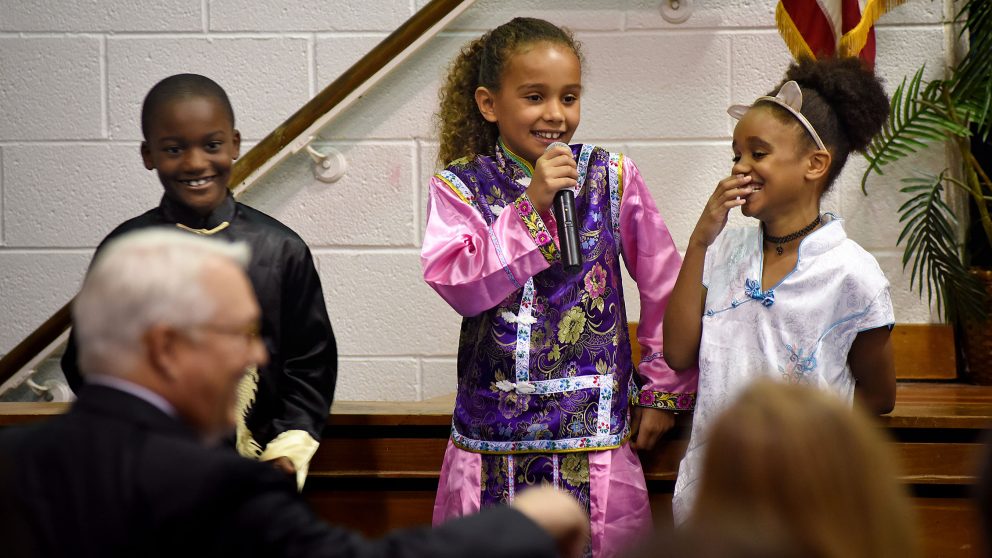Why Language Education Matters: NC State Co-Hosts Panel

How does language education influence our economic prosperity, enhance our security and deepen our understanding and appreciation of ourselves and others? What can we do to ensure that North Carolina’s children are prepared to thrive in our multilingual state, nation and world?
NC State’s College of Humanities and Social Sciences co-hosted a panel discussion with the American Academy of Arts and Sciences at Stough Elementary School — a Wake County Mandarin language immersion program site — on Sept. 29 to address this topic and discuss the findings and recommendations of the recent AAAS report, America’s Languages: Investing in Language Education for the 21st Century.

Distinguished leaders from federal and state government, business and K-12 and higher education assembled for the event. Following welcoming remarks from NC State Chancellor Randy Woodson and from Nancy Andrews, chair of the AAAS board, Jeff Braden, dean of NC State’s Humanities and Social Sciences, moderated a panel of experts:
- The Honorable David Price, U.S. Representative, North Carolina Fourth District; co-chair, U.S. House Humanities Caucus
- Dr. Kimberly Van Noort, vice president for academic programs, faculty and research for the UNC system
- The Honorable Karl Eikenberry, Oksenberg-Rohlen fellow and director of the U.S.-Asia Security Initiative at the Shorenstein Asia-Pacific Research Center, Stanford University; member, AAAS Commission on Language and Learning; former U.S. ambassador to Afghanistan
- Dr. Rick Van Sant, executive director, Go Global NC
The discussion focused around the AAAS report’s major recommendations, which are to:
- Increase the number of language teachers at all levels of education so that every child in every state has the opportunity to learn a language in addition to English.
- Supplement language instruction across the education system through public-private partnerships among schools, government, philanthropies, businesses and local community members.
- Support heritage languages already spoken in the United States, and help these languages persist from one generation to the next.
- Provide targeted support and programming for Native American languages as defined in the Native American Languages Act.
- Promote opportunities for students to learn languages in other countries by experiencing other cultures and immersing themselves in multilingual environments.
Panelists also identified challenges in building North Carolina’s language learning capacity. Those challenges include teacher shortages, general acceptance of the importance of linguistic and cultural understanding, and the need to support children who speak heritage or indigenous languages — Cherokee, for example — in our schools.
Braden pointed to instances in which NC State is serving as a leader in language education.
“NC State can take pride that our UNC-NC State Language Exchange is highlighted in the commission’s report as an example that other universities and systems might follow,” he says. “We worked hard for this program’s adoption by the UNC system so that students can enroll in language courses at campuses across the UNC system, regardless of where they physically attend.” NC State’s Ruth Gross, head of the Department of Foreign Languages and Literatures, chairs the language exchange.
Braden says NC State is a leader in preparing teachers of foreign languages, ESL teachers, and graduates who are fluent in languages and cultures other than their own. “At NC State,” he says, “we think and do in languages from Arabic to Urdu.”
- Categories:


